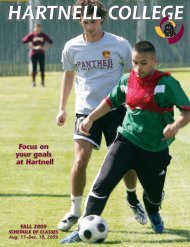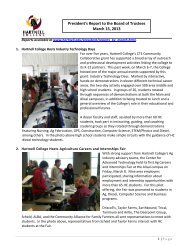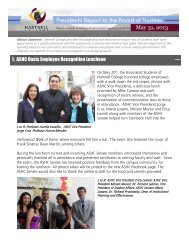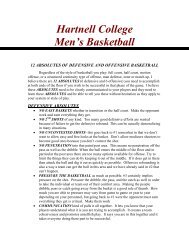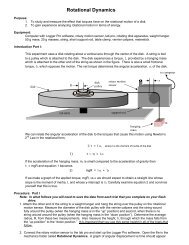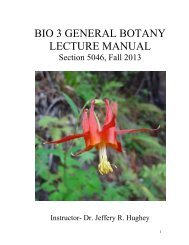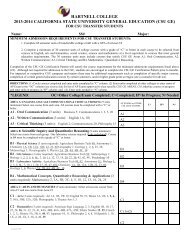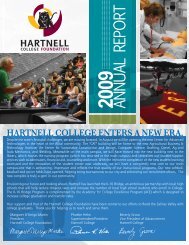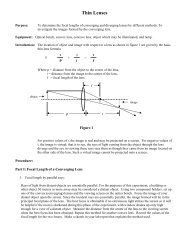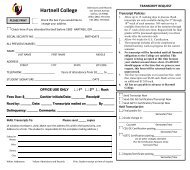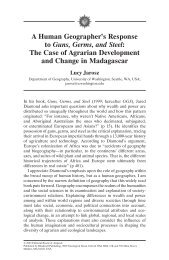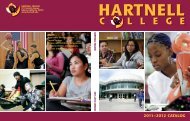Accreditation - Hartnell College!!
Accreditation - Hartnell College!!
Accreditation - Hartnell College!!
You also want an ePaper? Increase the reach of your titles
YUMPU automatically turns print PDFs into web optimized ePapers that Google loves.
Institutional Self Evaluation – 12-05-12<br />
techniques; clarity of communication, direction, and advice, creation of an educational<br />
environment that respects the dignity and individuality of each student—and professional<br />
conduct, including participation in professional activities and college committees, and<br />
cooperative behavior and willingness to help students with their academic growth. The<br />
evaluation also may assess enumerated professional competence, professional growth, and<br />
professional activities. The process includes several classroom or service observations by<br />
peers and a supervisor, evaluations by students, and a self evaluation. Both the peer and the<br />
supervisor prepare work site observation reports and together prepare a summary evaluation.<br />
Probationary faculty are evaluated at least once during each year of probation. More frequent<br />
evaluations are conducted at the discretion of the District. Regular academic faculty are<br />
evaluated at least once every six regular semesters. The timelines for evaluation are specific<br />
and extensive. At the end of each review process, probationary faculty are provided with a<br />
summary of the evaluations, and recommendations for continued improvement.<br />
<strong>Hartnell</strong> <strong>College</strong>‘s written tenure review process has remained substantially unchanged for at<br />
least a decade. The Academic Senate has been interested to change the process to include<br />
more faculty participation, particularly in the composition of the Tenure Review Committee.<br />
Currently, while each probationary faculty member has an individualized evaluation team<br />
containing his or her peer and supervisor, there is one Tenure Review Committee that reviews<br />
the evaluations of all probationary faculty each year. The Committee is composed of two<br />
administrators (the vice presidents of Academic Affairs and Student Services, or their<br />
designees) and two faculty (the Academic Senate president and vice president, or their<br />
designees).<br />
For the last several years, a partner in the law firm of Liebert Cassidy and Whitmore has<br />
presented a tenure review rules and responsibilities workshop to the Board of Trustees at its<br />
March meeting, just before it hears tenure recommendations and makes its determination on<br />
the award of continuing contracts or tenure. That attorney has advised the Board that the<br />
<strong>Hartnell</strong> Tenure Review process is a very good one.<br />
Part-time faculty are evaluated for their teaching ability and other areas of professional<br />
competence. The District and the faculty union have agreed to negotiate a process for the<br />
evaluation of part-time faculty, but this has not yet been accomplished. This process will be<br />
sunshined for the successor agreement in the faculty-District CBA negotiations in the spring.<br />
Considering that the District, like so many community colleges, relies heavily on the<br />
contributions of part-time faculty, this is an area of critical importance.<br />
<strong>Hartnell</strong> has been further challenged in this respect by the uncertain and changing staffing of<br />
the academic areas. For instance, in 2007 and 2008, a transformation committee<br />
recommended that the college reorganize in several ways, including the assignment of<br />
academic chairs to departments. The scope of responsibilities for these faculty roles was left<br />
to be negotiated. In the meantime, no deans were hired, as much of that work was to be<br />
accomplished by the new academic chairs, and faculty who accepted release time to perform<br />
the administrative duties of a chair role (called ―pod leaders‖) saw their role as excluding<br />
evaluative duties. Despite diligent and congenial negotiations over the next two years, the<br />
Page 195



